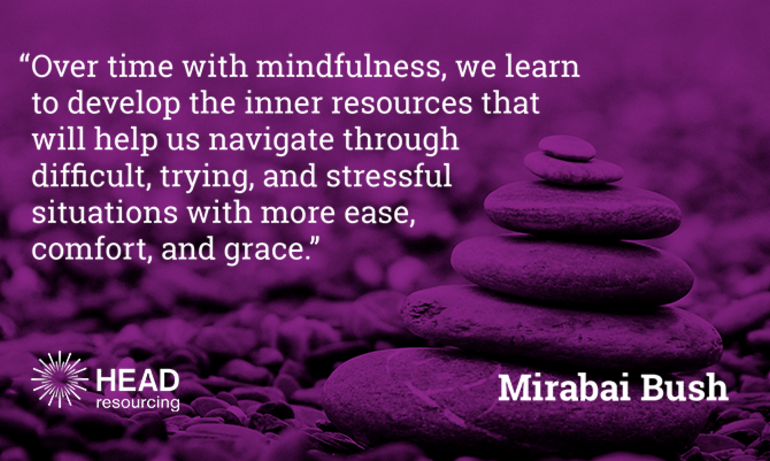Working as an HR professional within any business, I aim to make a sound contribution by building good working relationships, adopting a commercial approach and delivering agile plans that support what the business needs to deliver. Therefore, rightly or wrongly, I keep clear of anything that has even remote connotations with the ‘tea and sympathy’ HR offering of old *shudders*.
That being said, 25% of people in the UK will suffer some kind of mental health problem, and with stress or depression being the biggest causes of sickness in our country (Source: Mental Health Foundation) the wellbeing of employees should always be on the ‘business agenda’ (and if HR needs to wave this particular flag, so be it). Perhaps that’s why the likes of Apple, Ikea, Google, KPMG, BlackRock, Goldman Sachs and the NHS are just a few organisations who have embraced a practice that dates back over 2,000 years: Mindfulness.
What is Mindfulness?
Based on meditational practices rooted in Buddhism, mindfulness is about focussing on the ‘here and now’, on your own thoughts and feelings, without judgement. The idea is that when practiced over time, mindfulness techniques can develop clarity of thought by reducing the ‘chatter’ or ‘noise’ in your brain, enabling you to make decisions based on rational perspectives; not just emotional ones.
Mindfulness: the science
Some neuroscientific research suggests that mindfulness practices can lead to physical changes in the brain’s structure, resulting in better problem solving and decision-making skills and the ability to manage reactions to stressful situations. Within a workplace context, the application of mindfulness has the potential benefits of reducing the cost of staff absenteeism, improving memory, learning ability and creativity, improving productivity and overall staff and business well-being. (Source: Guardian)
Mirabai Bush, who introduced mindfulness training to Google, says that whilst it doesn’t prevent conflict or problems, when issues do arise ‘they are more likely to be skilfully acknowledged, held, and responded to by the group’.
Over time with mindfulness, we learn to develop the inner resources that will help us navigate through difficult, trying, and stressful situations with more ease, comfort, and grace’.
Mirabai Bush
Why should I be mindful?
Think about all the things you do in just one day; the speed at which many of us now operate, the myriad of technology which gives us 24/7 access to information and data. It’s not surprising that we sometimes find ourselves not really listening to what someone has said to us because we’ve ‘zoned out’ or because we’re trying to multitask and simultaneously check that important text/email. Not the end of the world, but it’s not particularly efficient… and it can be fairly exhausting. What if there was a way to train your mind to become more focused, and better able to handle challenging situations at work and in your personal life?
If you have the time (and, let’s be honest, the money) there are a plethora of mindfulness training programmes out there (e.g. Mindfulness Based Cognitive Therapy, Cranfield’s ‘Mindfulness for Higher Performance’) or alternatively there are downloadable apps (e.g. Headspace, Calm, Stop Breathe and Think). All of which claim to help build mental resilience and improve emotional regulation.
However, if you’re still sceptical – I’m not convinced Buddha intended for his teachings to be relayed for what is ultimately commercial gain – then perhaps taking a few practical steps to just shut out the ‘noise’, regain clarity and focus, is a bit more palatable.
A good place to start is simply five minutes or so of mindful breathing:
Sit comfortably and relax, with your hands in your lap
Breathe in slowly, and out slowly, focusing completely on each inward and outward breath
When your mind wanders (Did I switch off the iron? What time’s my first meeting?) just let the thoughts come and go, and return to focusing on your breath.
I know I don’t have the inclination to set aside half an hour every day to meditate, but I’m pretty sure I could commit to just this one mindful daily habit. I’ve got nothing to lose, and who knows? It may just make a positive difference to me and those around me.

.png)